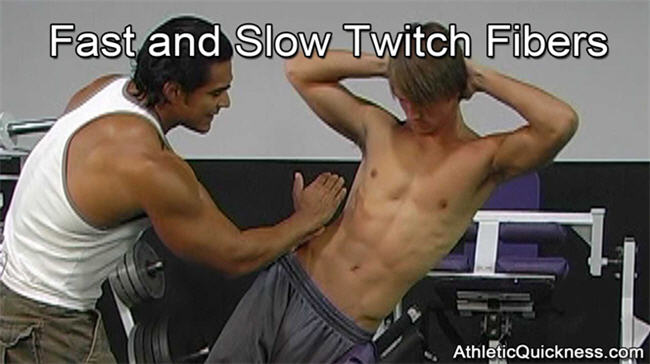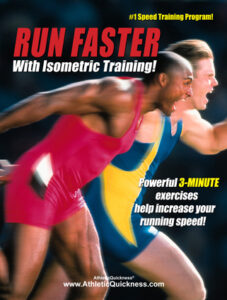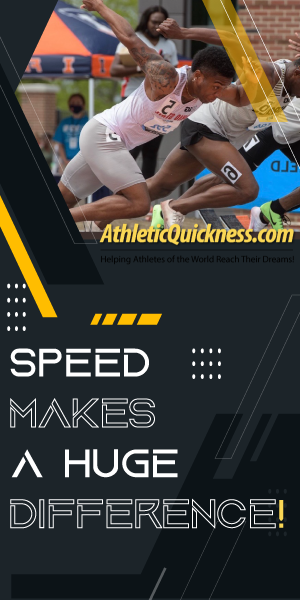Fast Twitch and Slow Twitch Fibers
Part 1: Muscle Tissue and Contractions
Part 2: Types of Muscles
Part 3: Fast Twitch and Slow Twitch Muscles
Part 4: Physiological Effects of Strenuous Exercise
Skeletal muscle consists of two main fiber types:
Type I fibers and Type II fibers.
The Type II fibers are further subdivided into two groups: 1) Type IIa and 2) Type IIb
Type I, Slow twitch Fibers.
They are called slow twitch fibers because when compared to the Type II fibers, they are slower to contract. Some studies suggest that their contraction rate is two to three times slower than Type II fibers.
The slow twitch fibers are found throughout your body but they are in higher concentrations along the postural muscles of your spine. They are highly resistant to fatigue. This allows them to maintain your posture, both sitting and standing for hours at a time before you feel any tiredness or soreness in them.
They have the ability to withstand fatigue because they contain large and numerous energy producing mitochondria when compared to Type II fibers plus they also contain high levels of myoglobin that gives them a dark reddish color. In laymen’s terms, slow twitch fibers are known as “dark meat”
Other characteristics of Type I fibers are their large number of capillaries per cross section and their ability to generate ATP aerobically. Athletes who are born with a higher percentage of slow twitch fibers in their body tend to excel in events where endurance is required, such as in running a marathon.
Type IIa, Fast Twitch Fibers. These are called fast twitch fibers because when compared to Type I fibers, they are considerably faster to contract, however, they don’t contract as fast as the Type II b fibers, which are the fastest of them all.
Type IIa fibers are similar to Type I fibers in that they also contain high level of mitochondria. This makes them moderately resistance to fatigue.
Their capillary density is relatively high, although not as high as Type I fibers, but still it is considerably higher than Type IIb fibers. This along with an equally high concentration of myoglobin as the Type I fibers gives them a reddish color as well.
These fiber types are also found throughout the body but are predominantly located in the extremities. Generally speaking, the amount of force a Type IIa fiber can produce is typically greater than Type I but less than Type IIb, but this also depends upon the situation you find yourself in since all muscles are capable of extremely strong contractions given the right circumstances.
[sc name=”2-stepoptin-blue”]
An example of how all of your muscles can contract very strongly is when you are playing a contact sport such as football and are getting prepared to take a hit from a defender. Slow twitch muscles along your spine clamp down on your vertebrae to prevent injury just as hard as the fast twitch fibers in your extremities. However, since there is no real lever where these slow twitch fibers are attached to measure their force, they are often mistakenly considered weaker in comparison.
Athletes who are born with a higher concentration of Type IIa fibers tend to excel in your middle distance track events such as the mile and ½ mile as well as team sports such as basketball and soccer.
Type IIb, Fast Twitch Fibers. These are the fastest fibers types in the body. They are located predominantly in the arms and legs. Their ability to contract fast along with their location in the body enables them to generate very powerful contractions over a short period of time.
The downside to this is they fatigue very easily. One can maybe sustain an activity such as sprinting at a high rate for only 20-30 seconds before their speed begins to drop off.
This is due to their low myoglobin content, lowered numbers of energy producing mitochondria when compared to Type I fibers, and lowered density of capillaries per cross section. These characteristics also give them a pale colored and in laymen’s terms, this fiber type is referred to as light or “white meat”.
Part 1: Muscle Tissue and Contractions
Part 2: Types of Muscles
Part 3: Fast Twitch and Slow Twitch Muscles
Part 4: Physiological Effects of Strenuous Exercise
[sc name=”jumphigher testimonial banner – green”]
[sc name=”Order Here Button-01″]






